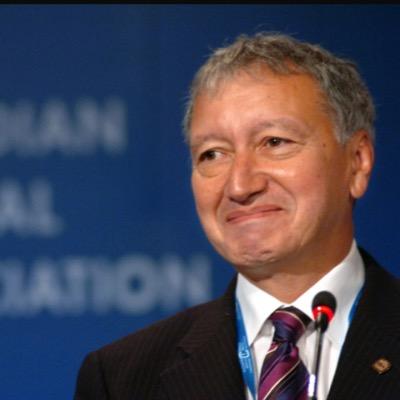
Dr. Brian Day
@DrBrianDay 
- Past President Canadian Medical Association
- Past President Arthroscopy Association of North America
- Honourary Associate Professor University of British Columbia
- 2014 Doctors of BC Don Rix Leadership Award


With long waiting lists for treatment compared with other western nations, Canada's health system needs some radical solutions, the country's top doctor says
Dr. Brian Day has been miscast. From the day he became president of the Canadian Medical Association, the B.C. orthopedic surgeon has been stereotyped as a radical bent on privatizing the health-care system.
Listen to him talk, though, and you realize that's not the case. He's actually a reformer, dedicated to Canada's four-decade-old "single-payer" medicare system, but conscious it isn't working as well as it could. Moreover, he has some fascinating thoughts on fine-tuning the system -- and Saskatchewan's place in health reform.
He is well aware of the flaws in the American approach to healthcare, which leaves millions without coverage. But he also sees how the Canadian system has been allowed to develop long waiting lists. In addition to the misery of people on those lists, there is economic damage: an injury left untreated becomes worse and worse, with the economic cost (insurance payouts and lost wages) of waiting lists put at a stunning $14.8 billion in 2007. And this goes up as individuals go untreated.
He prescribes quick, but minor, surgery to the system. He argues the Canadian approach of giving block grants of money to health districts and hospitals to do their work should be replaced by one in which "the money follows the patient" -- as happens in virtually all other industrialized countries with public health-care systems.
The faster that hospitals and their personnel (and who knows the health-care system better?) figure out ways to heal patients, the more money these hospitals get. Day foresees a system in which public hospitals compete against other public hospitals -- and, yes, against private clinics. Day set up his own clinic in Vancouver because government cutbacks in the 1990s reduced the number of operating room hours allocated to him to a level below that needed to maintain currency in his specialty.
The cost of Day's prescription for change? A one-time injection of money (estimated at $7-10 billion nationally, and much less for a single province) that lets interested hospitals equip themselves and recruit personnel. Day adds that some British public hospitals (which function under the National Heath Service, the prototype for Saskatchewan's medicare system) have made astonishing reductions in waiting lists in mere years. The savings soon would pay for themselves.
As Day points out, we already have a mixed private-public medical system. Doctors offices, medical labs and many other facilities are private businesses operating within the publicly funded medical system -- and they work very well within it.
He suggests that Saskatchewan would be an ideal place for such an experiment: small enough to be manageable, but large enough to have a sophisticated medical infrastructure.
He deserves a hearing. Perhaps Saskatchewan again can be a pioneer in health-care innovation.